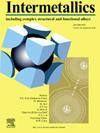SnPbInBiSb high-entropy solder joints with inhibited interfacial IMC growth and high shear strength
IF 4.8
2区 材料科学
Q2 CHEMISTRY, PHYSICAL
引用次数: 0
Abstract
The rapid advancements in microelectronic devices towards miniaturization and multifunctionality have led to an increasing demand for solder joints that exhibit enhanced mechanical properties and reliability. This study focuses on investigating the high-shear strength of SnPbInBiSb/Cu high-entropy solder joints. The analysis encompasses the microstructure evolution, interfacial reactions, and shear behavior of these solder joints after reflowing at 180 °C. The study reveals the formation of very thin intermetallic compound (IMC) layers, specifically Cu6Sn5 and Cu3Sn, at the SnPbInBiSb/Cu interface with an average thickness of about 1.04 μm following a 10min reflow. Transmission electron microscopy (TEM) analysis illustrates the presence of nanoscale precipitates of InSn3 or Sn3Sb phases dispersed within the Cu6Sn5 IMC. The high mixing entropy of the SnPbInBiSb solder contributes to the suppression of the interfacial IMC growth rate during the reflow process. Notably, the shear strength and fracture behavior of the SnPbInBiSb high-entropy solder joints are significantly influenced by the thickness of the interfacial IMC. In particular, solder joints reflowed at 180 °C for 10 min exhibit a high shear strength of 102.4 MPa with a ductile fracture mode.
具有抑制界面 IMC 生长和高剪切强度的 SnPbInBiSb 高熵焊点
随着微电子器件向微型化和多功能化的快速发展,对具有更强机械性能和可靠性的焊点的需求也在不断增加。本研究的重点是研究 SnPbInBiSb/Cu 高熵焊点的高剪切强度。分析包括这些焊点在 180 °C 回流后的微观结构演变、界面反应和剪切行为。研究结果表明,回流 10 分钟后,在 SnPbInBiSb/Cu 接口上形成了非常薄的金属间化合物 (IMC) 层,特别是 Cu6Sn5 和 Cu3Sn,平均厚度约为 1.04 μm。透射电子显微镜(TEM)分析表明,在 Cu6Sn5 IMC 中分散着 InSn3 或 Sn3Sb 相的纳米级沉淀。SnPbInBiSb 焊料的高混合熵有助于抑制回流过程中的界面 IMC 增长率。值得注意的是,SnPbInBiSb 高熵焊点的剪切强度和断裂行为受到界面 IMC 厚度的显著影响。特别是,在 180 °C 下回流 10 分钟的焊点具有 102.4 兆帕的高剪切强度和韧性断裂模式。
本文章由计算机程序翻译,如有差异,请以英文原文为准。
求助全文
约1分钟内获得全文
求助全文
来源期刊

Intermetallics
工程技术-材料科学:综合
CiteScore
7.80
自引率
9.10%
发文量
291
审稿时长
37 days
期刊介绍:
This journal is a platform for publishing innovative research and overviews for advancing our understanding of the structure, property, and functionality of complex metallic alloys, including intermetallics, metallic glasses, and high entropy alloys.
The journal reports the science and engineering of metallic materials in the following aspects:
Theories and experiments which address the relationship between property and structure in all length scales.
Physical modeling and numerical simulations which provide a comprehensive understanding of experimental observations.
Stimulated methodologies to characterize the structure and chemistry of materials that correlate the properties.
Technological applications resulting from the understanding of property-structure relationship in materials.
Novel and cutting-edge results warranting rapid communication.
The journal also publishes special issues on selected topics and overviews by invitation only.
 求助内容:
求助内容: 应助结果提醒方式:
应助结果提醒方式:


